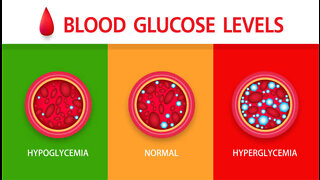Premium Only Content

Blood Sugar: Your Key to Vibrant Health
As you know, I have been counseling women to lay off the sugar for about twenty years now. When I talk about sugar, I am referring to refined sugar, the white stuff.
I first started talking about the negative effects of sugar in all it’s forms – bread, potatoes, alcohol, rice and even beans — at a time when most “experts” were blaming fat in our diets for causing obesity and other health problems. Those same experts told you to eat lots of low-fat and non-fat carbs to promote heart health.
By now you have probably heard the news—fat is NOT the health culprit we’ve been led to believe. It’s SUGAR! And those same starchy carbs the experts told you to eat can actually be detrimental to your heart, especially if you are a woman.
What You Need To Know About Sugar
Whether or not you realize it, many of the foods you eat on a regular basis contain a lot of sugar, even the ones that are marketed as “healthy.” A perfect example is yogurt. Some brands contain more sugar than you need for the entire day!
That said, all food contains some sugar, and glucose is an important energy source. The key is to understand how the food you eat, and sugar in particular, affects your body, and to know exactly how much you need to be healthy.
Here are some facts about sugar you should know:
Carbohydrates (including grains and even fruit) are converted to sugar and dumped into the blood stream. That said, I’ve never heard of anyone overdosing on apples or berries. They are nutrient-dense foods. It is packaged and processed grains and fruits that do the damage.
Even a slight increase in fasting blood sugar translates into oxidative damage to the lining of blood vessels throughout the body. And this damage may not show up for years.
Today’s diet, which includes excessive amount of these kinds of carbohydrates for many, many people, has led to obesity, diabetes, cancer, Alzheimer’s, and heart disease—epidemics that are affecting the entire planet.
Oxidative stress and cellular inflammation from blood sugar that is too high is the final common pathway for all chronic degenerative disease.
My Advice For Getting Your Blood Sugar Under Control
Controlling your blood sugar is the key to maintaining an anti-inflammatory state. You can do this by consuming high-fiber, unrefined foods at every meal. Be sure to include high-quality protein such as wild fish, organic meats, tempeh, nuts or seeds. Use healthy anti-inflammatory fats, such as olive oil, coconut oil, flax oil, hemp oil, and chia oil.
I have information in my books that can help you lower your blood sugar. In addition, I have a lot of information on this website to help you get off the sugar. For example, I offer tips for healthy blood sugar, ways to recover from “sugar addiction”, and even a detailed explanation of how women’s hearts are hurt by sugar so you can dive into the details.
Wherever you decide to start, my advice is don’t wait until you have a disease to stop cellular inflammation. Take action now. This way, you can get a handle on it long before you get a “diagnosis” of a disease. Here’s how:
Get your fasting blood sugar tested. Ideal blood sugar levels are between 85 to 90mg/dl. Anything higher than that is too high despite what your doctor says.
Test your hemoglobin A1c . Your A1c determines how well your blood sugar has been controlled over a 6-12 week period. Normal is between 4-5.6%.
Read labels carefully and keep track of your daily sugar intake. When reading labels, the easy thing to remember is, if has an “ose” on the end, it’s sugar: Glucose, fructose, sucrose, and even lactose are all sugars.
Get familiar with the glycemic index. Know the Glycemic Index for the foods you regularly eat and try to stay with foods that are in the low to moderate range. For more information about Glycemic Index, I suggest that you read The Belly Fat Cure by Jorge Cruise and Healthy for Life by Ray Strand, M.D.
Buy a glucometer. Even if you don’t have diabetes, you can use a glucometer to see what foods, activities, and stressors cause your blood sugar to shoot up. Think of it as a biofeedback device.
How have you changed your diet? And how has it affected your health? Have you ever used a glucometer, and if so what was your experience with it? I’d love to hear how you were able to lower your blood sugar to a normal range.
-
 15:22
15:22
Leading authority on women's health and wellness.
1 year agoHold Them Accountable
2.4K19 -
 47:50
47:50
Health Nutrition and Motivation
2 years agoHow High Blood Sugar Wrecks Your Health
23 -
 59:01
59:01
The Liberty Lobbyist
4 hours ago"We Only Have NOW To Make a Difference"
22.3K2 -
 4:16:41
4:16:41
CatboyKami
6 hours agoStalker 2 Blind playthrough pt1
22.3K2 -
 1:06:27
1:06:27
Russell Brand
6 hours agoNeil Oliver on the Rise of Independent Media, Cultural Awakening & Fighting Centralized Power –SF498
193K261 -
 1:39:14
1:39:14
vivafrei
6 hours agoSoros Karma in New York! Tammy Duckwarth Spreads LIES About Tulsi Gabbard! Pennsylvania FLIPS & MORE
92.5K65 -
 1:57:36
1:57:36
The Charlie Kirk Show
5 hours agoInside the Transition + The Bathroom Battle + Ban Pharma Ads? | Rep. Mace, Tucker, Carr | 11.21.24
142K60 -
 59:20
59:20
The Dan Bongino Show
8 hours agoBitter CNN Goes After Me (Ep. 2375) - 11/21/2024
914K3.69K -
 57:28
57:28
TheMonicaCrowleyPodcast
3 hours agoThe Monica Crowley Podcast: Mandate into Action
23.5K2 -
 1:02:09
1:02:09
TheAlecLaceShow
6 hours agoGuests: Alex Marlow & Terry Schilling | Justice For Laken Riley | Russian ICBM | The Alec Lace Show
36.1K8